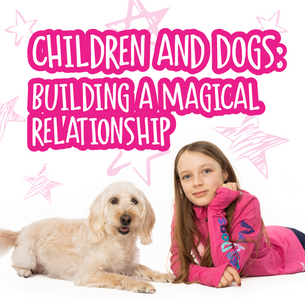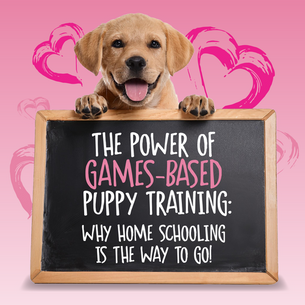Sharing our lives with our dogs is such a truly amazing thing. The playful fun, endless love and comforting companionship they bring can enrich our lives like nothing else, however these wonderful highs are almost always guaranteed to go hand-in-paw with a few lows when you inevitably encounter training struggles or behaviour challenges with your dog, such as leash pulling, reactivity, barking, separation anxiety, jumping up, poor manners or lack of recall.
When it comes to navigating these struggles with your dog, finding a way to resolve them can easily become confusing and overwhelming when you consider how many different methods, approaches and ‘schools of thought’ there are in the dog training world, but how do you know which methods and techniques are going to bring you real-life training success and truly solve any behaviour problems you might have with your dog?
In this blog, we’re clearing up the confusion and tackling the seemingly age-old topic of punishment vs positive reinforcement in dog training. We’ll take a look into why punishment and aversive training techniques often fail, and we’ll delve into how you can achieve true training success with your dog through effective, rewarding strategies and positive, force-free training methods that ensure better behaviour, a stronger bond and a happier life with your dog.
The Problem with Common Advice for Dog Behaviour Challenges
At Absolute Dogs, we’ve faced and seen every training and behaviour problem you could imagine, and we understand how these struggles can really impact your life, your relationship with your dog and can even leave you feeling disappointed that your dog-owning dream is not quite how you imagined it would be.
Whether it be your dog stealing things and counter-surfing or sniffing too much on walks, or even if you’re struggling with puppy training, dog-dog reactivity issues, jumping on guests, toilet training, or quite literally any struggle your dog might throw your way, being unable to improve or solve your dog’s training and behaviour problems can leave you feeling frustrated, fed up and even powerless – like there’s no hope of ever fixing the challenges you are facing with your dog.
When you are facing daily training and behaviour struggles that feel almost impossible to solve on your own, not knowing where to turn for solutions can be tough.
There will always be people around you, ready to give you their thoughts and advice on training a dog, from friends, family, neighbours, and even that ‘all-knowing’ local at the dog park. There are even some dog trainers that will push you toward stronger, more aversive training techniques or tools to punish and correct your dog’s ‘bad’ or ‘inappropriate’ behaviours – training methods that won’t actually solve your problems, or help your dog with their struggles.
And on top of all that, when you go online, there are seemingly endless amounts of information and advice promoting every kind training method under the sun or promising ‘quick fixes’ and it can be incredibly overwhelming! You might even begin to feel pressured to change the way you train your dog – like you have to try dog training methods or techniques you’re not sure of, that make you feel uncomfortable or that you couldn’t ever imagine using with your dog.
You might find yourself wondering “Is Punishment Necessary in Dog Training?” and we’re here to tell you that, no matter a dog's training or behaviour struggles, age, size or breed, any form of punishment or aversive training technique is absolutely not necessary – in dog training or everyday life!
Punishment and Aversive Dog Training Methods: What Do They Look Like?
We all get dogs with a dream in mind, a vision of the future. When that dream doesn’t quite meet our current reality and our dogs are showing struggles in their behaviour or training, it can be so easy to fall into the trap of getting caught up in the problem and feeling lost and overwhelmed. It can feel pretty lonely too!
In frustration and desperation, we might turn to ‘quick fix’ dog training methods that often promote punishment, intimidation, force and more aversive training methods to try to solve our dog’s ‘problems’.
PUNISHMENT IN DOG TRAINING COMMONLY INVOLVES:
❌ Verbal and physical pressure or intimidation.
❌ Shouting, scolding or giving 'the silent treatment'.
❌ Adding or taking away things that make a dog uncomfortable.
❌ Inflicting physical force, discomfort or pain.
❌ Using aversive tools like shock and prong collars, leash jerking and popping, loud noises, throwing disks, spray bottles (and so much more – it's a scary world out there for our dogs)!
The truth is, punishment can come in so many forms, none of which are going to help us support our dogs in their struggles or resolve their “issues” (which are actually just dog behaviour)!
3 Reasons Why Punishment Fails to Fix Dog Training and Behaviour Issues
The above list is some of the most common types of punishment you might see in dog training, however in reality, punishment is anything that your dog will seek to avoid or escape. Even more importantly, your dog is the one that decides what is punishing or aversive in their world. We dive into this in more detail in our Training with Force episode of the Sexier than a Squirrel podcast.
The simple fact is, using negative reinforcement, positive and negative punishment or aversive tools and training methods to discipline a dog – or to try to stop ‘bad’ behaviour – just doesn’t work. These techniques and methods fail to ‘fix’ or bring about effective, long-term change in training and behavioural struggles because they just suppress the ‘bad behaviour’ as the dog tries to avoid experiences they find unpleasant or punishing.
So, when you use anything your dog finds aversive in any area of their life, it has a serious impact on them – and the relationship you share together!
USING PUNISHMENT OR AVERSIVE METHODS TO TRAIN YOUR DOG:
❌ May lead to a dog who is more frustrated, stressed & anxious about life.
❌ Could cause pain and lead to injury.
❌ Can suppress a dog’s ability to communicate pain or discomfort.
❌ Is likely to result in confusion, fear and a dog who stops responding/shuts down.
❌ Does not help your dog learn the desirable behaviours you DO want to see!
❌ Risks relationship and trust breakdown and damages your bond with your dog.
At Absolute Dogs, we know all too well what happens when dog training advice goes wrong, and we want to ensure that every dog and owner partnership are set up for training success without ever needing to consider punishing methods or aversive dog training techniques. That’s why we’ve collected our top three reasons why punishment and aversive methods fail in dog training, and why it isn’t necessary or effective, and we’re diving into them below.
#1: Using Punishment and Aversives to Train Your Dog Damages Your Relationship
When you punish your dog, use aversive tools or try to force or intimidate them into behaving a certain way, you risk breaking your dog's trust in you and damaging your relationship with them.
It's also absolutely vital that we, as our dog’s guardians and very best advocates, understand how much of a detrimental impact punishment can have on their ability to communicate when they are uncomfortable, scared or in pain.
Let’s take a really common example, and consider times when a dog uses a growl to tell you:
❌ Not to approach them whilst they are eating…
❌ That having their nails trimmed is uncomfortable or painful…
❌ They do not want another dog approaching them…
❌ To leave them alone as they rest on their bed…
❌ They do not want to interact with the child that is crawling all over them…
If that dog is punished for using a growl to communicate their needs, they may feel like they aren’t being understood clearly. Their communication signals may escalate in future, and they may simply skip that step in their communication chain and jump to reacting or biting as they try to express their discomfort.
#2: Using Punishment, Aversives or Negative Reinforcement Won’t Teach Your Dog the Right Way to Behave
Using punishment or aversive tools in your training and daily life with your dog doesn’t actually teach them what YOU WANT or what they are supposed TO DO, nor does it help them learn which behaviours and choices they make are appropriate and desirable.
Punishing your dog for unwanted or inappropriate behaviour – that often happens because your dog is communicating a need or just acting on their natural instincts – simply causes confusion, frustration and likely leads to a dog who is increasingly anxious or worried about the world (and the humans around them)!
#3: Using Training Methods that Rely on Punishment and Aversive Tools Impacts Your Dog’s Wellbeing
These traditional, more outdated methods of training often have quite an impact on a dog’s physical, mental and general well-being and can even impact their quality of life.
Methods like negative reinforcement or using aversive tools also don’t build your dog’s confidence and certainly won’t grow their optimism – and using punishment in your dog’s training, or throughout daily life when you encounter inappropriate or unwanted behaviour, might cause your dog to stop responding to you. They may even totally shut down.
3 Positive Success Strategies Every Dog Needs for Punishment Free Dog Training
At Absolute Dogs, we believe in transforming every single dog training and behaviour struggle through inspiring and rewarding great choices and using joy-filled, fun and force-free, positive training strategies!
In fact, these days, there are so many highly effective, positive dog training techniques that focus on growing your dog’s confidence, trust and a strong bond with you, while teaching them real-life skills and building better behaviour – just like we do here at Absolute Dogs with our games-based concept training approach.
These more modern methods use powerful, science-based positive reinforcement strategies alongside engaging, rewards-based games and experiences to transform struggles by reshaping a dog’s brain and teaching them the essential skills they need to know about living in our world and having wonderful manners and good behaviour – no punishment or aversive training necessary.
When it comes to training ANY dog, it is these positive and rewarding, science-based methods that are going to achieve the lasting, real-life results we all dream of for our dogs – and you can check out our top three tips below on how you can transform ALL dog training and behaviour struggles without the use of punishing, or any aversive, training methods!
#1: Focus on Growing the Right Skills to Successfully Train Your Dog without Punishment
When it comes to achieving success in dog training, no matter your goals, the key is to focus on the positives, instead of focusing on punishing inappropriate or unwanted behaviour.
Train FOR the situation, not in the situation and work on growing the foundational skills your dog needs to successfully navigate life – like calmness, proximity, optimism, focus, disengagement and so much more!
By switching your focus away from the things you don’t want your dog to do, and redirecting their focus onto appropriate and desirable behaviours you DO want, you’re guaranteed to start seeing more of that “good dog” behaviour you’ve been dreaming of!
#2: Build Trust and Understanding through Positive Dog Training Techniques for Effective Communication without Punishment
Growling, barking, biting and changes in body language are some of the very few ways a dog has to communicate with us, so it’s absolutely vital that you step up and be your dog's very best advocate by building their trust in you through positive interactions and listening when they communicate.
Do observe your dog — and your surroundings — carefully in any environment so that you can ensure their safety while also guarding their confidence and optimism to ensure you set your dog up for success in any situation.
Don't put your dog in situations you know will make them uncomfortable. Take the time to train and grow the necessary skills to help them cope in situations and environments that worry them or make them feel insecure.
Don’t punish or discipline your dog – ever – for trying to communicate their needs to you or the world around them. They are communicating with the world in the only way they know how, and it’s up to you to be aware of their needs and listen when they offer a sign of communication, no matter how big or small.
Do be prepared to accept that there may be some situations where your dog will always struggle, and make plans for how you will approach these situations in the future. From keeping your dog away from multi-dog gatherings or large family parties to including “safety nets” in your training to help your dog cope with vet or groomer visits, visitors and more, it’s all about advocating for your dog and making sure you have their back in any situation!
#3: Use Positive, Science-Based Concept Training to Get Real-Life Results without Aversive Methods
In order to achieve lasting, real-life results in your dog’s training, your dog needs an environment where they get to WIN and feel like a superhero for the great decision-making skills they are growing with you.
Set your dog up for success by putting management in place to prevent the rehearsal of unwanted behaviour. If you are worried about your dog’s behaviour as you are working on growing those vital skills, you can use crates, pens, boundaries or popping your dog on lead to help them out – and remember that conditioning a muzzle is also an option so you can set your dog up for ultimate success (even if they never need it, it has so many uses)!
By taking just a few minutes each day to play targeted training games with your dog, you will not only begin to build great skills and resolve any behaviour struggles your dog might have, but you will also discover the keys to growing your dog’s confidence and establishing a bond based on trust and kind communication.
It is this foundation of positive, rewards-based training that will help you secure your dog’s focus in any environment, give your relationship an amazing boost and motivate your dog to work WITH you through fun learning experiences that bring both you and your dog joy. That’s the key to dog training success!
Play Games, Teach Concepts and Get Success!
At absoluteDOGS we know all struggles can be transformed, and we have loads of games and strategies for real-life, lasting results that you and your dog will LOVE! Are you ready to embrace the science of training your dog in a way that’s positive and force-free?! Are you ready to become a Gamechanger?
Want to learn even more? Maybe you’d like to hear from a trainer who has taken the path of aversive methods, and who set out to debunk positive dog training methods, only to totally transform into a superstar Absolute Dogs Pro Dog Trainer and embrace the Gamechanger Way?
No matter where you go from here, it’s time to embrace positive training methods and games-based concept training techniques to train your dog without punishment and aversives. It’s the dog training revolution that’s taking the world by storm, and we just KNOW it’s going to get you the real-life results success you are looking for with your dog!




